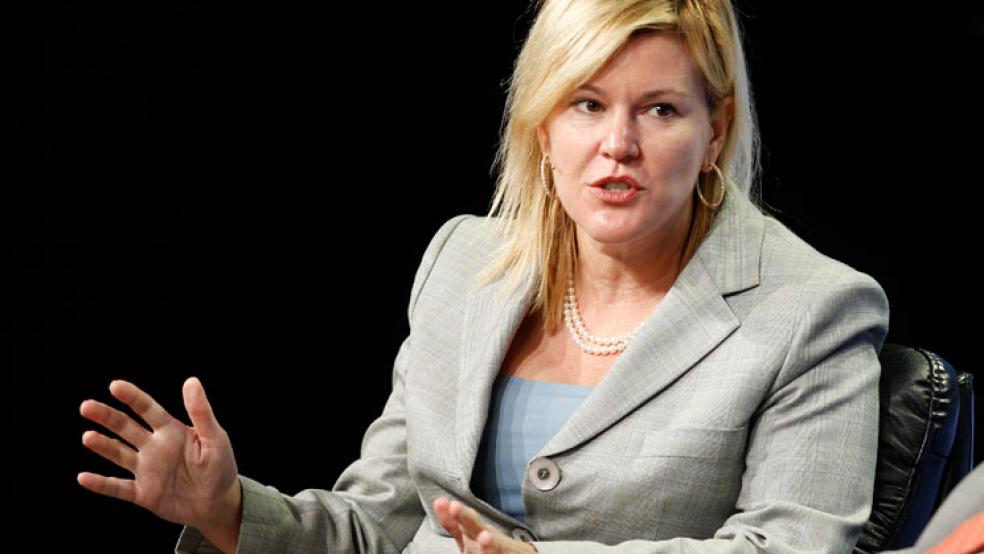It was the $17 billion investment call heard around the world.
Meredith Whitney’s prediction in October 2007 that Citigroup would be forced to cut its dividend as a result of losses on its mortgage portfolios trimmed not only that sizeable chunk off the value of Citi itself, but a total of $374 billion off the value of the S&P 500 as a whole.
Within a year, her near-apocalyptic vision of what lay ahead for Citi and the rest of the over-leveraged banking industry had come true, and Whitney was hailed as a prophetic pundit. Noted author Michael Lewis called her an “oracle.” She became one of a very small and elite group of people to have made just the right market call at almost precisely the right point in time.
The problem with pundits is what to do for an encore.
Some become known for long-term forecasts, and their moment in the sun lasts longer. Abby Joseph Cohen was one of those in the 1990s; her comments about the “Goldilocks economy” in the mid- to late 1990s made her so famous that when she forgot to take her passport on a trip to Canada in the more liberal days before the 9/11 terrorist attack, all she had to do was dash to a newsstand and pick up a copy of a major magazine containing a profile of her and a full page color photo to satisfy border control agents of her identity.
Eventually – as happens with all pundits whose wisdom is tied to a very specific kind of forecast – her moment in the spotlight ended. Perma-bear Nouriel Roubini and his views are far less ubiquitous today than they were in the aftermath of the financial crisis.
It’s tougher for celebrated Wall Street prophets to stay balanced on top of their pedestals once their predictions have proven to be accurate. They need to keep getting it right, to prove that those calls weren’t flukes and that they are more than one-shot wonders.
Rather than emphasizing some of the calls that Whitney has nailed – earlier this year she declared she has never been “this bullish … in my career” when it comes to stocks, and sure enough, the S&P is up 19 percent so far in 2013 and 10 percent ahead of when she made those comments – critics have focused on where she has gotten it wrong.
Specifically, they’ve targeted her completely erroneous prediction that 2011 would bring with it “hundreds of billions of dollars” of defaults on the part of states and municipalities, and equally massive losses on the part of muni bond investors. In fact, the months that followed Whitney’s forecast were characterized by a decline in the rate of insolvency filings on the part of muni bond issuers. And in spite of Detroit’s high-profile bankruptcy earlier this year, nothing has shaken the conviction of institutional investors that those warning of an apocalyptic meltdown are victims of a myth about how the muni bond market works.
Is there a direct link between Whitney’s spectacular call on banks, her big “miss” on muni bonds and her decision, reported last week, to shut down her investment research and brokerage business? Probably.
Let’s face it, it’s hard to transform a great call and a track record as a smart analyst on Wall Street into a brand, as Whitney tried to do when she left Oppenheimer to open her own firm in 2009. Back then, she attracted 30 clients; as of July, that figure had reportedly dropped to only 14. By the beginning of this month, more clients and many employees had defected.
Concentrating on running a hedge fund, as Whitney appears intent on doing next, is a smart move in this context. As her recently-published book, Fate of the States, makes clear, she isn’t backing away from her analysis that big problems lie ahead, at least for what she calls the “housing bust” states (primarily on the Atlantic and Pacific coasts, such as California). In contrast, Whitney is upbeat about the outlook for so-called flyover country: Midwestern states that she expects will continue to experience an economic boom from new energy (read: fracking in the Bakken Shield) and rising agricultural exports and prices.
Putting her money where her mouth is will give Whitney a chance to establish a track record that is the sum of all her investment ideas, not just the ones she presents most vehemently on television or that grab the headlines. Of course, her investors may not be any more patient than her brokerage clients reportedly were.
Still, Alan Greenspan’s experience – he warned of “irrational exuberance” in the stock market more than three years before the dotcom bubble finally burst – proved that being very, very early doesn’t mean that you won’t turn out to be right, eventually. Had investors listened to Greenspan, though, they would have forfeited three years’ worth of upside – another reason why being early and being wrong are often conflated on Wall Street.
For pundits, timing is everything. For hedge fund managers, that is even more true, as the typical fund levies management fees of 2 percent or so and 20 percent of any upside. Whitney now has a chance to live or die based on the numbers she posts year after year, and that’s what Wall Street is all about. We may never learn the specifics, but you can be sure that if those figures are bad, word will leak out rapidly enough.
The biggest upside, for Whitney, at least? Well, with the new JOBS Act enabling hedge fund managers to talk openly about what they’re doing without running the risk that the SEC will view their market opinions as an effort to solicit new investors, she won’t have to relinquish her place in the CNBC spotlight.
Just don’t get seduced by the glib soundbites you hear, regardless of who they come from. Collectively, these folks have been shown to get it right only about half of the time.







